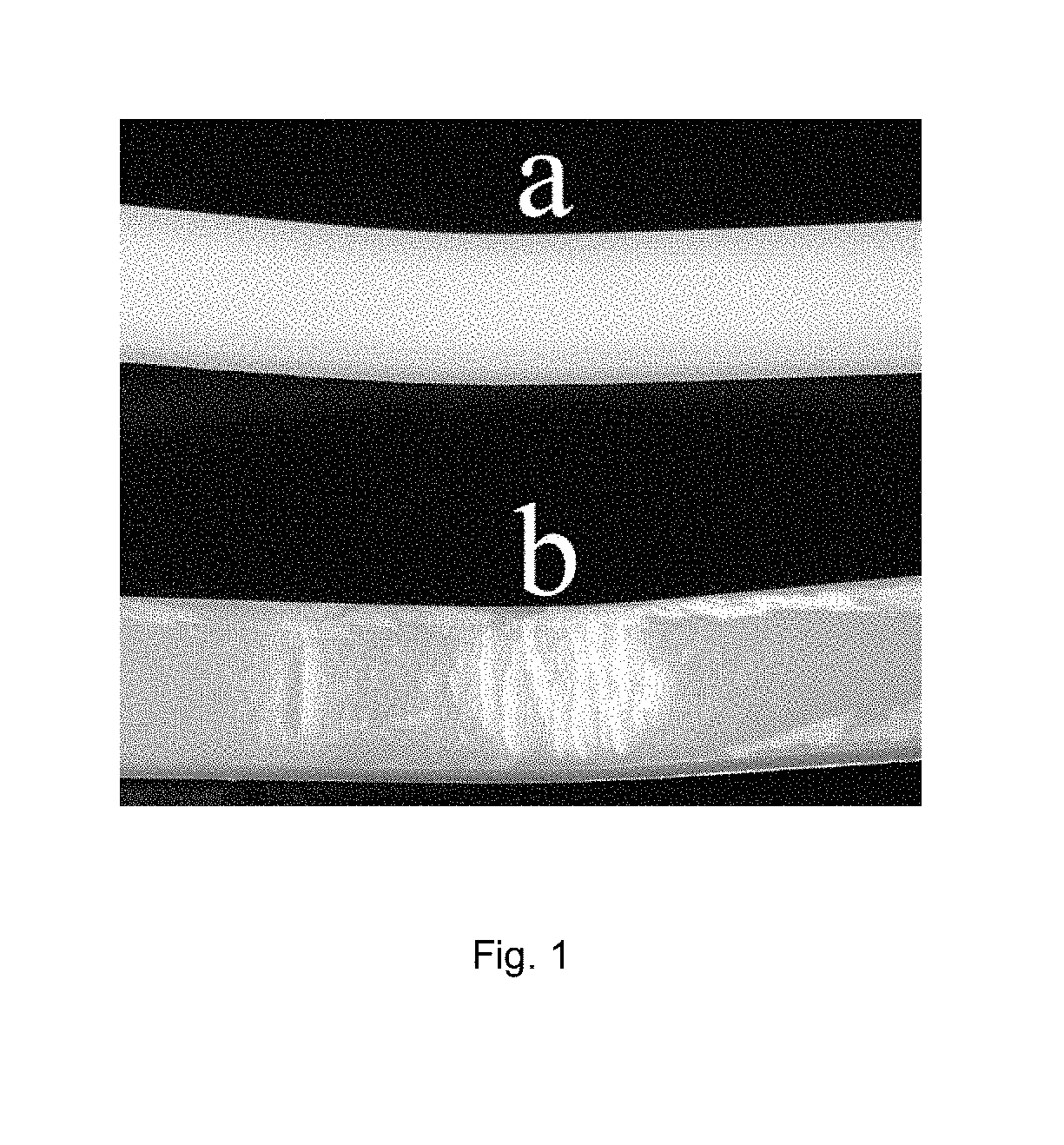Biocarbon and nylon based hybrid carbonaceous biocomposites and methods of making those and using thereof
a carbonaceous biocomposites and biocarbon-based technology, applied in the field of nylon-based biocarbon-based carbonaceous hybrid biocomposites and methods of making those, can solve the problems of underperformance compared to the theoretical properties, tensile strength and young's modulus of nylon/pp blends is reduced well below the strength and stiffness of neat nylon, and achieves low carbon footprint , high strength and stiffness, the effect of producing sustainably
- Summary
- Abstract
- Description
- Claims
- Application Information
AI Technical Summary
Benefits of technology
Problems solved by technology
Method used
Image
Examples
example 1
[0102]A. Materials, Trade Names and Manufacturers.
[0103]In Table 6, the materials used to produce example samples are listed, as well as trade names and manufacturers.
TABLE 6Materials used for examples, brands and suppliers.Chemical nameTrade NameManufacturerNylon 6 (PA6)Ultramid B3K,BASFUltramid B27ENylon 6,10 (PA6,10)Mazmid 6.10Mazzaferro Industria eComercio de Polimeros eFibres Ltda (Brazil)Polypropylene (PP)PP 1120HPinnacle PolymersPolylactic acid (PLA)PLA 3251D IngeoNatureworks LLCMaleated polypropyleneFusabond P353DuPont(MAPP)Maleated polyethyleneFusabond N493DuPont(MAPE)Chain extender / impactZeMac Extend L65VertellusmodifierEpoxidized naturalEpoxypreneSanyo Corporation ofrubberAmericaZinc stearateZinc stearateFisher ScientificBiocarbon from—Genesis Industries,miscanthusCompetitive GreenTechnologiesGlass fiberChopvantage HPPPG Industries3610Recycled carbon fiberCompetitive GreenTechnologiesSurface modifiedNanomer I.30TNanocornanoclayTalcArctic MistImerys TalcPeroxideLuperox 101...
example 2
Polyamide and Biocarbon
A. Materials and Methods
[0155]The polyamide used was a bio-based polyamide 6,10 (Table 3). Biocarbon used in this work presented in Table 3.
[0156]All materials were dried prior to usage. The biocarbon was milled using a ball mill. PA 6,10 composites were made with biocarbon at 20 wt. % loading from crushed, milled and fractionated milled biocarbon particle size ranges of <63, 213-250 and 426-500 μm. The crushed biocarbon used here was broken down to smaller particles (below 1 cm) to allow for easy access through the hopper of the compounder during processing. The milled biocarbon had a particle size range of <500 μm. All composites were processed using a HAAKE MiniLab II Micro Compounder (Thermo Scientific, MA, USA) and then injection molded using a HAAKE MiniJet Injection molding machine (Thermo Scientific, MA, USA). For simplicity and ease of identification, the composites have been referred to as BC-1, BC-2, BC-3, BC-4 and BC-5 for nylon f...
example 3
and its Size Effects on Polyamide 6 / Biocarbon Composites
[0172]In this study, we pretreat the biocarbon by ball milling for different time periods. These pretreated biocarbons are incorporated into the nylon matrix at 10 wt. % loading to fabricate composites. We find that at very small particle sizes; mean particle sizes between 3.803-2.039 microns, the impact strength is the same as that of neat nylon 6 while the strength is comparable.
Based on this study, nylon / biocarbon composites with a mean biocarbon particle size of 3.0803 microns and below show equal or better impact strengths to that of the nylon while also enhancing the flexural and tensile properties.
PUM
| Property | Measurement | Unit |
|---|---|---|
| particle size | aaaaa | aaaaa |
| mean particle size | aaaaa | aaaaa |
| mean particle size | aaaaa | aaaaa |
Abstract
Description
Claims
Application Information
 Login to View More
Login to View More - R&D
- Intellectual Property
- Life Sciences
- Materials
- Tech Scout
- Unparalleled Data Quality
- Higher Quality Content
- 60% Fewer Hallucinations
Browse by: Latest US Patents, China's latest patents, Technical Efficacy Thesaurus, Application Domain, Technology Topic, Popular Technical Reports.
© 2025 PatSnap. All rights reserved.Legal|Privacy policy|Modern Slavery Act Transparency Statement|Sitemap|About US| Contact US: help@patsnap.com

